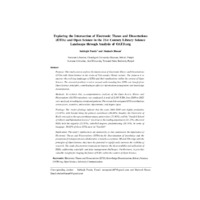Exploring the Intersection of Electronic Theses and Dissertations (ETDs) and Open Science in the 21st Century Library Science Landscape through Analysis of OATD.org
Metadata
Exploring the Intersection of Electronic Theses and Dissertations (ETDs) and Open Science in the 21st Century Library Science Landscape through Analysis of OATD.org
Purpose: This study aims to explore the intersection of Electronic Theses and Dissertations (ETDs) with Open Science in the realm of 21st-century library science. The purpose is to uncover the evolving landscape of ETDs and their implications within the context of Open Science. The research problem revolves around understanding how ETDs can benefit from Open Science principles, contributing to effective information management and knowledge dissemination. Methods: To achieve this, a comprehensive analysis of the Open Access Theses and Dissertations (OATD) repository was conducted. A total of 2,683 ETDs from 2000 to 2023 were analyzed, revealing key trends and patterns. The research investigated ETD contributions across years, countries, universities, departments, and degree types. Findings: The 'study's findings indicate that the years 2004-2008 were highly productive (32.91%), with Sweden being the primary contributor (38.84%). Notably, the University of Borås emerged as the top contributor among universities (21.36%), and the "Swedish School of Library and Information Science" stood out as the leading department (21.32%). Doctoral ETDs held the majority (23.85%), with PhD degrees predominating (20.16%). In terms of language, 38.02% of these ETDs were in "Swedish". Implication: The study's implications are noteworthy as they underscore the importance of Electronic Theses and Dissertations (ETDs) in the dissemination of knowledge and the promotion of transparent and collaborative scholarly ecosystems. When ETDs align with the principles of Open Science, they have the potential to significantly increase the visibility of research. The study also presents strategies to improve the discoverability and utilization of ETDs, addressing copyright and data management challenges. Furthermore, it provides valuable insights for shaping the future of ETDs within the context of Open Science.
2023

